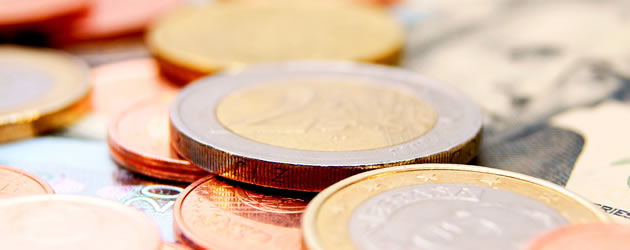 The Pound to Euro exchange rate (GBP/EUR) ended the day almost exactly where it started, at around 1.1780, as the European Central Bank opted to leave the benchmark interest rate on hold at 0.75%.
The Pound to Euro exchange rate (GBP/EUR) ended the day almost exactly where it started, at around 1.1780, as the European Central Bank opted to leave the benchmark interest rate on hold at 0.75%.
The single currency declined as ECB Chief Mario Draghi made comments regarding “downside risks” to the Eurozone economy in the second half of this year, but the Euro bounced back as Draghi rebutted claims that Cyprus could become a model for future bailout packages.
Earlier on in the day the Pound breathed a huge sigh of relief as the hugely important Service Sector PMI print showed a greater expansion than expected during March. The Service Industry – which accounts for around 70% of UK GDP output – posted a score of 52.4, trumping analysts’ forecasts of 51.5. The bullish report marked the biggest leap in output since August of last year, when the Olympic Games gave Britain a substantial economic boost.
Chris Williamson of Markit Economics, who compiled the report, said the: “upturn in the Service Sector during March looks set to have helped the UK avoid a triple-dip recession by the narrowest of margins”. Indeed, the expansive report is thought to have influenced the Bank of England’s decision later on in the day to keep the benchmark interest rate on hold at 0.50% and maintain its current quantitative easing target of £375 billion.
Sterling touched a daily high of 1.1852 against the Euro (GBP/EUR) during Mario Draghi’s ECB policy statement as traders reacted critically to the ECB Chief’s dovish tone. Investors were particularly perturbed by Draghi’s insistence that “monetary policy stance will remain accommodative for as long as possible”, which was seen to pave the way for further interest rate cuts or unconventional easing measures in the near future.
The single currency was also hounded as Draghi predicted that risks such as slow implementation of structural reforms by governments and weak domestic demand could lead to a subdued economic recovery later this year:
“Weak economic activity has extended into the early part of the year and a gradual recovery is projected for the second half of this year, subject to downside risks”.
However, the Euro shot back into demand as ‘Super’ Mario attempted to distance the ECB from the first Cyprus bailout proposal, which featured a universal tax levy of 6.75% on savings that were supposed to be protected under EU law:
“The ECB had presented a proposal where no levy on insured depositors was foreseen… a levy on insured depositors was not smart, to say the least”.
Draghi went on to state that “Cyprus is no template”, which soothed market tensions and allowed the single currency to erase Sterling’s earlier 0.75 cent gains. This statement was especially welcomed by traders who had been spooked by comments from Eurogroup Chairman Jeroen Dijsselbloem suggesting that further raids on deposits could feature in future bailout packages.
Overall the positive Sterling data, suggesting that Britain narrowly avoided slipping into a triple-dip recession in the first quarter of 2013, was equalled out by the ECB’s insistence that Eurozone bank deposits are safe from Cyprus-style losses. The Bank of England also elected to hold steady on monetary policy, but a substantial number of market-players still remain skeptical that the UK Central Bank can hold fire over the next few months, and for this reason the BoE announcement had less of an impact on the Pound to Euro exchange rate (GBP/EUR).

Comments are closed.